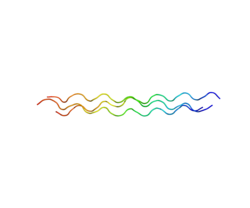COL5A1
| Type V collagen, alpha 1 | ||
|---|---|---|

|
||
| Ribbon model of the protein COL5A1 according to PDB 1A89 | ||
| other names |
|
|
| Properties of human protein | ||
| Mass / length primary structure | 183,560 daltons / 1,838 amino acids | |
| Identifier | ||
| Gene names | COL5A1; EDSC | |
| External IDs | ||
| Occurrence | ||
| Parent taxon | Chordata | |
| Orthologue | ||
| human | House mouse | |
| Entrez | 1289 | 12831 |
| Ensemble | ENSG00000130635 | ENSMUSG00000026837 |
| UniProt | P20908 | O88207 |
| Refseq (mRNA) | NM_000093 | NM_015734 |
| Refseq (protein) | NP_000084.3 | NP_056549.2 |
| Gene locus | Chr 9: 134.64 - 134.84 Mb | Chr 2: 27.89 - 28.04 Mb |
| PubMed search | 1289 |
12831
|
Type V collagen, alpha 1 , also known as alpha-1 type V collagen , is a fibrillar collagen encoded by the COL5A1 gene in the human organism . It is an integral part of tissues and regulates the arrangement of heterotypic nerve fibers . COL5A1 is commonly expressed in mesenchymal stem / stromal cells of the bone marrow and in amnion cells .
Structure and function
COL5A1 has two domains : on the one hand the laminin G-like domain (position: 72–244) and on the other hand the fibrillar collagen NC1 domain (NC1 stands for C -terminal and non-collagen, position: 1609–1837). Furthermore, COL5A1 has four distinctive regions:
- non-helical region (position: 231-443, length: 213)
- interrupted collagenous region (position: 444-558, length: 115)
- triple helical region (position: 559–1570, length: 1012)
- non-helical region (position: 1581-1605, length: 35)
The C terminus, also known as the COLFI domain, plays a critical role in tissue growth and repair. It controls the intracellular composition of procollagen molecules and extracellular collagen fibrils. The COLFI domain binds a calcium ion so that its function comes into play. The C terminus forms carbonyl groups at positions 1660 and 1662 in order to be able to bind the calcium ion.
COL5A1 plays a fundamental role in the control of fibrillogenesis . What is unusual is that it is resistant to collagenases but sensitive to trypsin . As part of the subordinate connective tissue, it is distributed almost ubiquitously. It can bind to DNA, heparan sulfate , thrombospondin , heparin and insulin .
Mutations
Mutations in this gene are associated with Ehlers-Danlos syndrome , classic type.